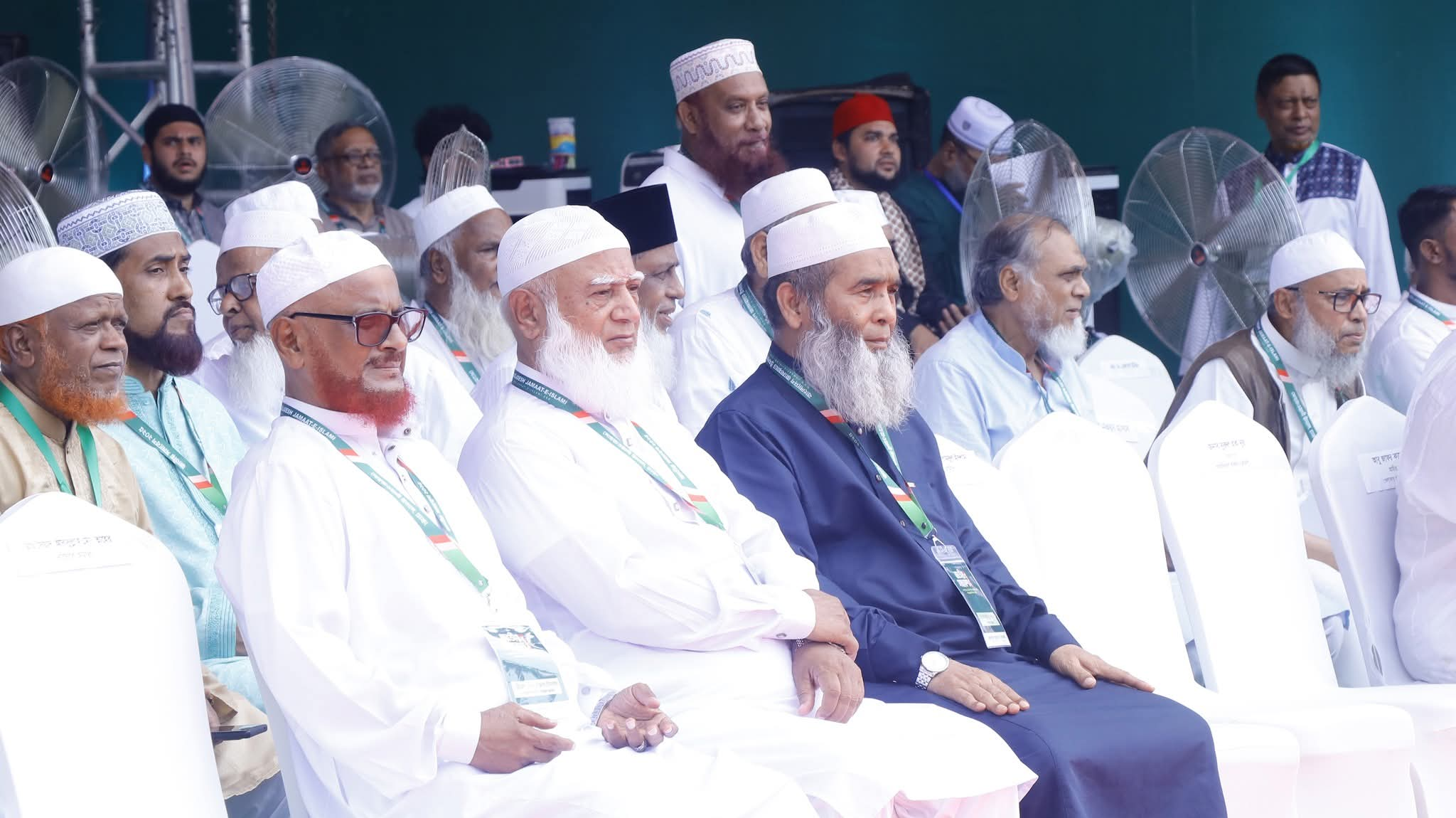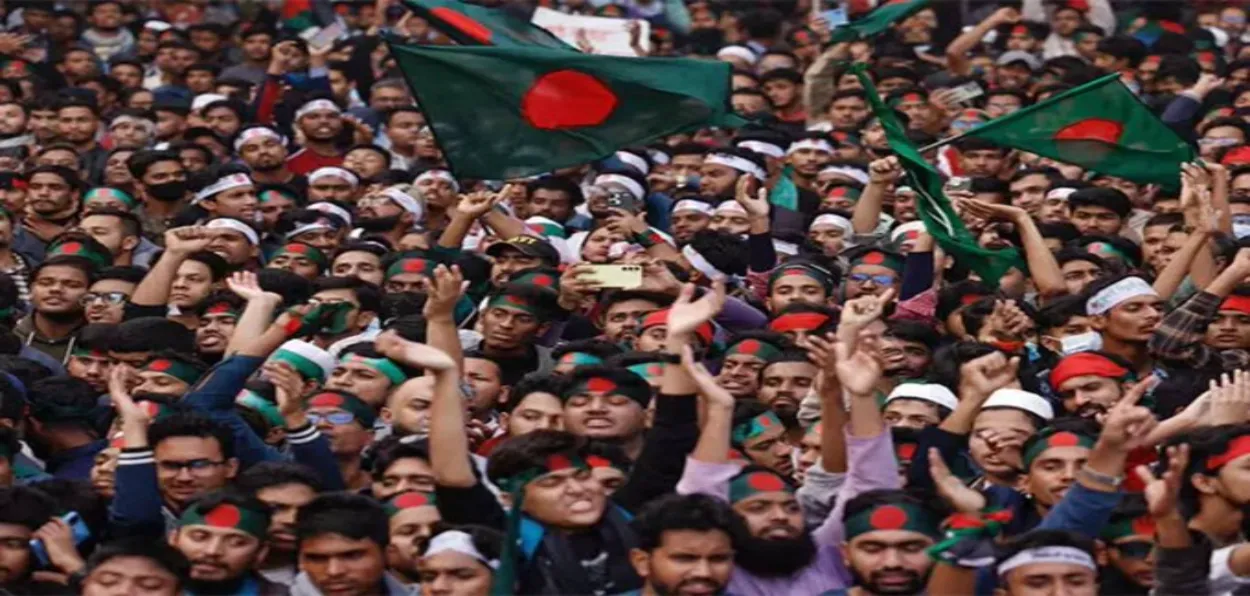.webp)
Aditi Bhaduri
In a show of power projection, The Jamaat-e-Islami Bangladesh (JIB) held one of its biggest rallies in Dhaka on 19 July. This comes soon after the interim government headed by Chief Advisor Mohammed Yunus lifted the ban on the organization placed by Sheikh Hasina in her final days in office. The Hasina government accused JIB of fomenting the August 2024 violence.
The Jamat is likely to participate in the polls tentatively scheduled in April 2026. In that case, it will be just another instance of Bangladesh's descent into Islamists, with ominous implications for India.
The JIB has a controversial history. Born in undivided India in 1941, the Jamaat-e-Islami was the subcontinental twin of the Middle East's Muslim Brotherhood, which it also influenced. Founded by ideologue Syed Abul Ala Mawdudi, it advocated the establishment - even by force, if required - of an Islamic sharia state in India.
Mawdudi, often hailed for opposing the Partition of 1947, did so only because he wanted to see Sharia established in all of the subcontinent, not just a part. During the Partition, he moved to Pakistan and subsequently led the JeI Pakistan, from which later sprang the Bangladesh Jamaat in what was then East Pakistan.
However, even in the 1970 elections, the JIB secured 17 percent of the votes but didn’t win a single seat in East Pakistan. The Bangladesh Jamaat played a significant role during the 1971 liberation war, collaborating closely with the Pakistani army. Many of its leaders were later imprisoned and executed on charges of war crimes.
Nevertheless, the Jamaat remained a potent force in both Bangladesh's society and politics. It was courted by General Zia-ur-Rehman, who captured power in Bangladesh through a coup. He turned to the JIB for support. Thus began the Jamaat's alignment with the Bangladesh Nationalist Party (BNP), the other major political party in Bangladesh, alongside the Awami League. The Jamaat's student wing, the Bangladesh Chatro Shibir, was at the forefront of the protests - and the ensuing violence - that led to Hasina's ouster last year.
 Leaders of Jamaat-e-Islami Bangladesh at the rally in Dhaka
Leaders of Jamaat-e-Islami Bangladesh at the rally in Dhaka
Support from the BNP
After 1971, the Jamaat was a despised lot, frowned at and viewed with suspicion for its role in the genocide of Bengalis. At the same time, it managed to retain its core base of around 10 percent of Bangladeshis, majorly concentrated in Rajashahi and along the country’s borders with India.
Sheikh Mujibur Rehman and his Awami League party clamped down on the JIB, with many of its key activists, including leader Gholam Azam, fleeing to Saudi Arabia and Pakistan. In these countries, the Jamaat framed the narrative that Mujib was clamping down on the organization as a means of undermining Islam in the newly liberated country. Besides, the Awami League also framed legislation including the International Crimes (Tribunals) Act of 1973, which enabled the government “to provide for the detention, prosecution and punishment of persons for genocide, crimes against humanity, war crimes and other crimes under international law”.
However, the assassination of Mujib and the military coup by General Zia ur Rehman enabled the Jamaat to make a comeback in Bangladesh's political and social life. Many JIB activists returned to Bangladesh from their self-imposed exile. It helped the Islamisation of the country, which was born to become a democratic, secular, and pluralistic state.
This began with the amendment to the 1972 Constitution to insert “Bismillah-Ar-Rahman-Ar-Rahim” (“in the name of Allah, the beneficent, the merciful”) in the preamble. The principle of secularism was removed from the Constitution in 1977 through the Fifth Amendment. In 1988, Islam was declared the state religion.
The JIB began contesting elections from 1986. Its leader, Motiur Rahman Nizami, served as a Minister of Industry and later agriculture; its general secretary, Ali Ahsan Mohammad Mojaheed, served the Ministry of Social Welfare.
The JIB greatly enabled a slow but steady erosion of the Bengali identity and a greater Arabisation of society, with ample funds from West Asian countries. For instance, the general and traditional expression of "Khuda Hafez" changed to the Islamised "Allah Hafez". There were assaults on the syncretic Bengali cultural practices like the "jatras" or street plays. And all of this was capped by rising discrimination and violence against minorities in the country who were seen to be collaborators with the Awami League.
Over the years, the JIB has also maintained close links with the Jamaat in Pakistan, Islamic Jihad, and Muslim Brotherhood in the Middle East.
The Shahbhagh Movement, which began with the widespread protests in February 2013 in Dhaka, demanded the death penalty for Jamaat activists like Abdul Qader Mollah, convicted of war crimes, as well as an end to religion-based parties and a ban on the Jamaat. In its election manifesto in 2008, the Awami League had promised to bring the war criminals to justice.
Several war criminals convicted to life imprisonment had their sentences changed to the death penalty. Jamaat and its affiliates like the Ansarullah Bangla Team unleashed violence across Bangladesh, claiming the lives of many, including famous blogger and activist Ahmed Rajib Haider. Simultaneously, Jamaat supporters mounted attacks on minority Hindus. All of this culminated with the delisting of the Jamaat as a political party.

Students' protests of 2024 in Dhaka against Sheikh Hasina's regime
Finally, the Jamaat was banned in August 2024, a few days before Sheikh Hasina was ousted from power in Bangladesh. What was supposed to be a spontaneous students' movement against Bangladesh's quota system was hijacked and manipulated by the Jamaat's student wing, Chatto Shibbir.
These were the very people who were not satisfied with the overthrow of the Hasina government. They had to satiate themselves by the crude display of the former prime minister's undergarments. In an ironic twist of fate, the government of Nobel Laureate Yunus replicated the act of General Zia ur Rehman; he not only lifted the ban on the Jamaat, but also permitted it to register as a political party.
Given the absence of the Awami League from the political arena, Jamaat may now harbour ambitions to play a greater political role in the country. Its power projection is a challenge to both its traditional ally BNP, with whom it is said to have run into a stalemate over seat sharing, and to the Yunus-backed National Citizen Party.
Back to the Future
In the 600,000-strong rally on Saturday, JIB Ameer Shafiqur Rehman has warned that further violent struggle may await the party in its quest for justice and enforcement of the July Charter and Declaration.
Interestingly, the Jamaat has found support from the US. From the time of the resurrection of the war crimes tribunal in the country, the US has been against the delisting of the organization and has advocated for the its right to freedom of assembly, and speech, and repeatedly called for its participation in the country’s electoral process, in a manner reminiscent of the US's support for late Egyptian president Mohammed Morsi and his Muslim Brotherhood party.
ALSO READ: Khursheed Ahmad's mission of making Patna cultural and literary hub
Given how events in Bangladesh inevitably spill over into India, how hundreds, if not thousands, of Bangladeshis, including war criminals, cross over with impunity into India, and even live here undetected for years, the turn of events in Bangladesh is ominous for India. No one should forget how the conviction of Jamaat war criminals with Bengali blood on their hands, who had been complicit in the extermination of millions of Bengalis, and in the rape and dehumanisation of thousands of Bengali women, called forth an enormous rally in neighbouring Kolkata by several Islamist groups, protesting these very convictions.
The author is an Independent journalist and writes on Middle Eastern and Central Asian affairs.
